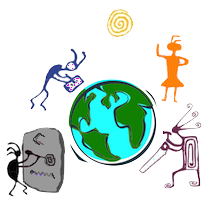
Advice for Travelers:
Travel With Respect
The world is a place of inequality. To be able to travel - and to
travel abroad - is a sign of a person's privilege.
You absolutely should travel if you have the privilege - it's a
wonderful, soul-enriching act that will bring you joy. If it
wasn't such, I not only wouldn't do it, I wouldn't have devoted an
entire section of my web site to it.
But never forget that to be able to travel depends on your
economic status, your passport and how the world labels or
categorizes you. Never forget that to be able to travel is a
privilege that you have.
There are people who want to travel but cannot travel because:
- they do not have the money.
- they have family obligations that will not allow them to
travel.
- their culture and the value system of the society they live in
will not allow them to travel.
- the country they are from is not one that other countries
welcome visitors from - they won't get a travel visa just by
applying for it.
These people without your privilege to travel see you, the person
that has such. And, sometimes, they also see your pity and
condensation. Or your outright disrespect and arrogance. And that
contributes how they see and treat all travelers -
including me.
If you travel, please travel from a place of respect. Do so
because you understand your privilege, you understand that you
have a role in how all travelers - especially foreigners - are
perceived. Do it because it's the right thing to do.
What does it mean to travel with respect? It means:
- Saying "Hello", "Please" and "Thank You" in the local
language. The Internet makes it oh-so-easy to learn this before
your trip.
- Reading about a place before you travel there, knowing even
just a bit about its history and current biggest challenges. It
means knowing when Ramadan is and if its widely observed
wherever you are going. It means going to Kentucky and not
saying, "Wow, look at that, you're wearing shoes and you have a
bathroom in your house!" It means going to Monument Valley and
not asking someone, "So, what's your Indian name?!" - and
knowing why that's not a question to ask. It means when you go
to Rwanda, you do to ask anyone, "So, are you Tutsi or Hutu?!"
(they are RWANDAN). Absolutely, ask questions - but show that
you've invested even a bit of time to understand more before you
got there.
- Knowing before you visit a place what the official or
unofficial dress code is. If locals in the place you visit
never, ever wear shorts in public, don't wear shorts in public.
If locals in the place you visit don't show bare arms, don't
show bare arms. I choose to wear a head scarf if I am in an area
where women wear head scarfs, and I choose not to go to any
country where I would be required to cover my face or not be
able to go anywhere my husband can go - I refuse to do that.
- Following the fight attendants instructions. Yes, we all heard
that the flight attendant on the plane you took from there to
here let you put only your bag in the overhead compartment and
made everyone else use another space, we totally believe that,
but on THIS flight, THIS flight attendant says you are going to
have to share the overhead space, so do it.
- No man-spreading on any transport you share with anyone, ever.
Not on the plane, not on the subway, not anywhere.
- Respecting sacred spaces. I'm an atheist, but I'm quiet in
churches, mosques, temples or burial grounds, and if I'm asked
to cover my head and shoulders, I do, and if I'm asked not to
touch something, I don't.
- Never taking photos of children, including with
children, unless you have asked for permission from their
parents. And thinking carefully about the appropriateness of
photos of yourself with children - there is growing backlash
against white people taking photos surrounded by African
children, as it contributes to an image of the "White Savior",
or the idea that the children are merely your props. As
ChildSafe notes, children
are NOT tourist attractions.
- No matter what you see other people doing, considering
carefully before you take a photo, or get a photo of yourself
taken, next to abandoned armaments (a tank, an anti-aircraft
gun), with a gun, with someone who is heavily armed, etc. I'm
not saying don't ever do it - just consider the people those
arms may have killed. And consider what locals would think of
your taking such a photo of yourself happily posing in front of
such. In your description of your photos online, describe what
happened that created this conflict and challenges still faced
by the community.
- No matter what you see other people doing, considering
carefully before you take a photo, or get a photo of yourself
taken, next to something that represents a disaster that killed
people: a collapsed damn, an abandoned city, etc. In your
description of your photos online, describe what happened that
created this disaster site. Educate, don't just celebrate "Hey,
look at me!"
- Considering carefully before you take a photo, or get a photo
of yourself taken, next to something that represents poverty.
I'm not saying don't ever do it - just consider the poverty that
is creating your photo opportunity. Are you contributing to a
negative stereotype about an area? Are you posting the photo to
educate people about the poverty of a region? Do you also have
lots of other photos that, in contrast, represent the beauty and
culture of local people and show that it's a complex area, just
like other places?
- Not putting yourself in danger for a selfie. According
to a 2018 article, more than 250 people around the world
have passed away in just six years while trying to take selfies.
Of the 259 deaths reviewed, researchers found the leading cause
to be drowning, followed by incidents involving transportation —
for example, taking a selfie in front of an oncoming train — and
falling from heights. Other causes of selfie-related deaths
include animals, firearms and electrocution. It's not just your
life that you put in danger: you put local people who have to
try to rescue you or recover your body at risk and put them into
completely unnecessary physical and mental strain.
- Not traveling to a place going through an epidemic or
pandemic, or in a post disaster situation or just barely out of
a conflict, when you could tax local health care systems with
your own health care issues, take up rooms in hotels that should
be reserved for health care professionals from abroad, and,
potentially, spread disease. If you are privileged enough to get
a vaccine against the novel coronavirus / COVID-19, don't think
that such makes it appropriate for you to go to a country that
is struggling with the disease - think carefully about if you
could be dramatically and clearly highlighting the inequalities
between poor countries and rich countries in terms of their
access to vaccines, other medicines, medical treatment,
transportation and international travel. More on traveling during a global pandemic.
- Considering carefully any plans to travel to a country that
has a horrific human rights record. There is no country without
at least some reprehensible human rights failures:
regarding ethnic minority groups, regarding people who are from
the LBGTQ community, regarding a certain religion, etc., so if
you avoid them all, you will have to live on the moon. But do
you really want to support countries with the most egregious
records: a country that forces women to cover their faces and go
through back doors to enter many public spaces and won't let
them drive (would you support a country that did that to an
ethnic minority group), a government that has seized power from
an elected government, a country or region where the police
regularly extort money from local people? When you go to a
region with your tourism dollars and post your beautiful photos
from there and your comments about, "Hey, foreign tourists get
treated really well here!", that's exactly what you are doing.
At least PLEASE don't take and post a photo with smiling police
officers or military members in a country where police regularly
extort and brutalize local people - don't downplay the fact that
those smiling men you got your photo with have been forcing
local people to pay them bribes all day - or worse.
- Not fund raising online for your personal journey somewhere.
"Give me money to live my dream of van life for a year in the
USA!" or "Hey, give me money to tour Africa by motorcycle!" It
is the height of arrogance and privilege to think people are
going to give you money to go have fun. If you decide to do that
anyway, and people really do give you money for your vanity
volunteering trip or whatever, think carefully as you travel
about sharing with others how you got the money. The few people
who are able to raise money for their dream vacation, because
they have wealthy friends and family, are creating a world-wide
belief that anyone, anywhere, can ask the Internet for money and
they will magically get it. It's creating unrealistic
expectations and posts to Quora like, "I'm from Lebanon. I want
to volunteer in Germany and get free housing. How do I do that?"
or "How can someone from Egypt volunteer around the world for
free?" I also have big issues with people who fundraise to "volunteer."
- Not asking local people to perform for you unless they are
professional performers expecting you to ask them and expecting
you to PAY. There is a video I've seen of a White French couple
traveling the world. They are in Kenya and meeting a Maasai
tribe. I think the tribe is out tending their animals. They are
welcoming and cordial. But then the French couple starts asking
them to do their traditional dance, which involves jumping. And
it's HORRIBLE. It's like walking up to someone on tribal land in
the USA and saying, "Hey, do a rain dance for me!" Don't be such
an ass, I beg you. But, absolutely, you can ask a professional
busker to play or sing or otherwise perform for you - and be
prepared to pay. If you see someone performing on the street and
you pause for a moment to enjoy it, look for the tip jar or tip
hat and put something in it - you saw part of the show, you
stopped to enjoy part of it, you should pay. And you should pay
even more if you record some of it. If you come upon a group of
friends making music, not professionally, but just being
together, think carefully about the appropriateness of recording
them - how out in public are they in that moment? Just be
mindful of the place and what's happening and if what you are
seeing is there specifically for your entertainment - or is, in
fact, a more private, personal moment.
- Not agreeing to have your photo taken with a baby animal (even
if you are assured that cheeta or tiger or whatever is an
"orphan") and NEVER riding elephants. Politely, firmly, refuse.
No matter how often you are told that the wild animals in
captivity, including elephants, are very well treated and that
they are not harmed by these activities, please don't do it. In
fact, refuse ALL opportunities to touch what should be a wild
animal, or to have your photo taken with such. Don't be
condescending or disrespectful. Just say, "I'm sorry, but I'm
not going to touch that animal." Share why only if you think it
is safe for you to do so and you won't insult your hosts.
- Not giving to children begging for money. When you give money
to begging children or buy something from children in the
street, you encourage their parents or the criminal syndicate
forcing them to do this to continue forcing them to do this.
This prevents them from going to school and locks them into a
cycle of poverty. Travel
ChildSafe says there are better ways to support children
and youth: use businesses that make a positive impact on the
local community, such as vocational training restaurants and
social enterprises, or donate to credible organizations
supporting children and their families.
- Not engaging in behavior that would make you a great candidate
for the White
Tourists subreddit, an online community "dedicated to
exposing the infamous hypocrisy, degeneracy, disrespect, and
violence regularly seen in tourists, travellers and expats from
white and white settler colonial countries."
What about foreigners wearing local clothes? There is not
universal agreement on this. Local people often don't have a
problem with foreigners that live in the area wearing clothes that
represent local culture - they often see it as embracing and
celebrating and honoring their culture, not appropriating it. But
your friends back home may chastise you when they see the photos
of you in such, or if you attempt to wear such in your own
community. I have a beautiful Nigeria outfit, with a gele, a gift
from dear Nigerian friends. But I can't wear it, not even for a
photo, because my white friends would erupt that I was engaging in
cultural appropriation. I look awesome in it, by the way, but
you'll never see it. I do sometimes wear clothes I bought in India
and Afghanistan, when I worked and traveled there - the clothes
are comfortable, great to work in, and aren't obviously "foreign"
such that most people in the Portland area won't say, "What in the
hell are you wearing?" Before choosing to buy something in a local
style, I always ask local people themselves about how they would
feel about me wearing it, and I ask more than one person -
different people may have different views on this.
Keep learning. Nothing is set in stone. I'm still learning
myself. I'm sure there are photos I've taken that someone would
consider inappropriate. I've taken down some photos I published
online upon reflection years later. Let's not play "gotcha" when
it comes to photos and clothes - do your best for yourself, per
your own conscience.
Final thoughts.
I'm not the travel police. I'm not the fashion police. I'm not
the culture police. I'm not the taste police. I'm not here to play
"gotcha."
I hesitate to judge others because I know I am far, far from
perfect.
I'm not posting this page from a place of bullying or judgement -
I'm publishing it from a place of sincerely wanting you to have a
wonderful time traveling, and for you to NOT contribute to
attitudes that make it hard for others to travel. Just think about
your own attitudes when people not from your community come to
where you live and fill up the restaurant you love, frequent a
place of business you do NOT like in your community, increase car
traffic, etc.
Also see:

transire benefaciendo:
"to travel along while doing good."
This is extensive advice for those wanting to make their travel
much more than only sight-seeing of the most famous places and
shopping, whether in your own country or abroad, and how to make
your sight-seeing an activity that educates you and benefits local
people and not harm local environments. I was the first person on
the Internet to use this term, transire benefaciendo, in
association with traveling and doing good (or, at least, not doing
bad / being harmful). This page strongly discourages vanity
volunteering / voluntourism.
Reasons NOT to volunteer
abroad.
This is a list of the most common reasons people say they want to
volunteer abroad. And they are NOT good reasons. In fact, these
motivations for volunteering and the "service" they result in
often hurts people and animals in other countries, rather than
helping. This list also provides the good reasons to volunteer
abroad, how you can help right in your own community to help
regarding a disaster far away, and more.
_______________________________________________






Disclaimer: Any activity incurs risk. The
author assumes no responsibility for the use of information
contained within this document.
This material is provided as is, with no expressed or
implied warranty.
Permission is granted to copy, present and/or distribute a
limited amount of material from my web site without
charge if the information is kept intact and is
credited to Jayne
Cravens
Please contact me for
permission to reprint, present or distribute these materials
(for instance, in a class or book or online event for which
you intend to charge).
The art work and material on this site was created
and is copyrighted 1996-2025
by Jayne Cravens, all rights reserved
(unless noted otherwise, or the art comes from a link to
another web site).
The personal opinions expressed on this page are solely
those of Ms. Cravens, unless otherwise noted.


